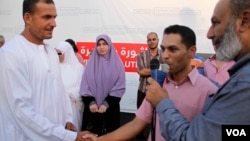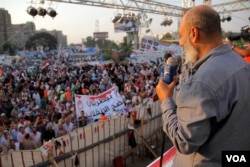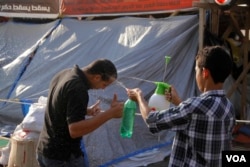CAIRO —
After two-and-a-half years of near constant protests, demonstrations in Egypt have become not only a political platform, but a form of entertainment, a social forum and for some people, a way to find love.
Before his marriage ceremony, groom Mohammad sang for the crowd, providing a break from daily rallies in favor of ousted president Mohamed Morsi.
“And you are smiling for me,” he sang. “And you say, ‘We are for each other,” and my heart beats faster from happiness.”
As he took his vows to be married according to Islamic Law, he also vowed that Morsi is the president, and the crowd went wild.
Another couple followed them onto the stage as fireworks went off. It was the seventh marriage on that day at the protest camp.
Directly after his marriage, Mohammad, 27, explained that he chose to marry his bride, Alia, in Rabaa, a sit-in that has been occupying several blocks in a commercial district in Cairo, two months after mass protests against Morsi, who remains detained by the military.
Mohammad said now that Alia is legally his wife, he will resume protesting.
The camp is organized by the Muslim Brotherhood and Mohammad said he wanted to marry there because the Brotherhood follows Islamic law. He added that he wanted to share the moment with his fellow demonstrators.
Morsi’s critics say although he was elected, he used his position to dismantle emerging democratic institutions and governed recklessly, deepening the country's political and economic turmoil.
Backstage before the ceremony, Imam Safot Hegazi said between the protests in Tahrir Square that forced Hosni Mubarak out of office in 2011 and the current demonstrations against military rule, he has performed 50 or 60 Islamic marriages for activist couples.
He said some couples met at protests and others chose to make it official at the demonstrations because the events are life-changing, and occasionally historical.
Other protesters said camaraderie is not why they came out to demonstrate, but it is one of the best parts of sticking around.
Senna Ibrahim usually teaches Arabic to small children, but on Sunday, she sat with a crowd of women in a tent near the stage where the daily ceremonies occur. She said when -- not if -- protesters’ demands for the restoration of the constitution and the re-instatement of Morsi are met, her new friends will be friends for life.
In a relatively quiet moment on the pathways between the tents where protesters sleep and eat, children squirted each other with water to stay cool.
A teenager played his drum to slogans like, “Down with military rule.”
But while the demonstration sometimes takes on a festive tone, young couples said they were not there to celebrate.
Hundreds of people have been killed in clashes in the past two months and the camp is surrounded by sandbags and barricades made of bricks torn out of the sidewalks. Army tanks block roads between military bases and protesters. On Tuesday morning, men streamed out of Rabaa, marching towards security buildings. Many had gas masks hanging around their necks.
The military-led interim government has ordered protesters to abandon this camp and another near Cairo University several times, but protesters refuse to leave. Analysts fear there will be hundreds of deaths if authorities attempt to dismantle the camps by force.
But at his marriage ceremony, Mohammad said despite the fear, people in the crowded, hot camp need to make time for happiness.














